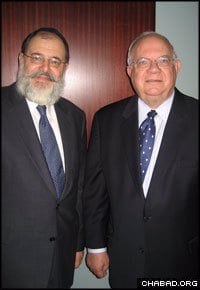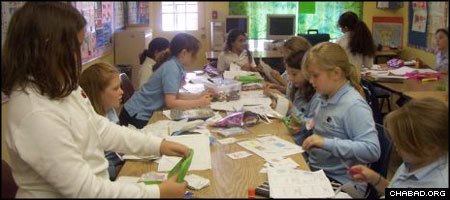Upon taking up the leadership of the largest accreditation agency of U.S. private schools, Rabbi Nochem Kaplan announced that in a world of separate education philosophies, it was still possible, indeed mandatory, to identify “immutable ideas that we all consider to be morally right.”
The rabbi, who just began a two-year term as president of the National Council for Private School Accreditation and also serves as director of the global Chabad-Lubavitch movement’s Office of Education, would be the first to admit that setting moral standards for education is a “very, very precarious and tricky thing to do.”
First of all, there’s the matter of reaching consensus, and settling the delicate issue of who should decide: Does every parent have an inherent right to determine how and what her child learns? Are all religious-based systems valid?
The stakes, though, are high, said Kaplan, who will help set his organization’s agenda into the next decade. In an age when more and more families are choosing private education for their children, people are acknowledging that “the public school system is broken.”
“That’s not to say that there aren’t some very good public schools and outstanding teachers,” qualified Kaplan, who also chairs the National Accreditation Board of Merkos L’Inyonei Chinuch, the educational arm of Chabad-Lubavitch. “But there are many, many failed teachers in classrooms destroying students. And beyond the fact that the American model tries to educate everyone in a one-size-fits-all approach, education does not happen in a vacuum. Students today are living in a culture that doesn’t prize education.”
Speaking just days after assuming the presidency of the NCPSA at its annual gathering in suburban Maryland, the rabbi offered that private schools, “any way you slice it, are a better product for less money,” due largely to their ability to tailor education to a specific philosophy, whether it’s Montessori or Jewish day schools.
The final test of an education program should go beyond math and science scores, and should instead be whether graduates are “able to be gainfully employed,” said Kaplan. “Do they have the moral compass to face the challenges of the next century?”
After that’s addressed, private schools have the freedom to define their individual missions, he said.
“Accreditation says, ‘You tell us what is outstanding for your school,’ ” he explained. “The Waldorf schools, for instance, will say they want to develop people who are creative thinkers who will make their own decisions about right and wrong.
“In Lubavitch, on the other hand, if we were bringing up children to think that the process of education is solely about getting a good job, instead of refining students’ character traits, we would be wasting our time.”

Everyone a Teacher
Looking at the immediate future, Kaplan – whose organization and its affiliates represent some 16,000 private schools across the United States – identified homeschooling as the next frontier in the realm of education.
“Ten years ago, the NCPSA recognized the need to accredit early childhood centers,” he said. “Now the thrust of discussions is seeing if we can set standards in homeschooling.”
More than 1.8 million children are being educated at home full time, noted the rabbi. “What are these parents doing? Imagine what it would mean if people way out on the right, or on the left, could suddenly educate their kids. Every subject would be filtered through that ideological lens. But if you set accreditation standards, things begin to gel differently.”
Kaplan, who was educated in England, the United States and Israel and holds degrees from Trinity College and Monmouth University, pointed to online education as the second burgeoning issue that needs to be addressed by the NCPSA and similar organizations.
“Everyone today worth their salt, from universities to high schools, is offering online courses,” he said. “That’s all fine and good, but how do you ensure quality? I walked into one of our high schools in Florida, and my niece was taking a calculus course online. But who’s the purveyor? What’s the subliminal message?”
Noting that he’s the first rabbi to occupy the top NCPSA post, Kaplan states that having a Jewish voice in the national discussion is important.
“We need to talk a lot more about moral and ethical standards,” he said. “We need to demand of our schools that they’re not morally-neutral grounds.”




Start a Discussion